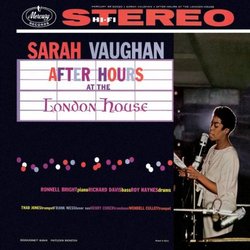| All Artists: Sarah Vaughan Title: After Hours at the London House (Dig) Members Wishing: 1 Total Copies: 0 Label: Verve Release Date: 7/26/2005 Album Type: Original recording remastered Genres: Jazz, Pop, Broadway & Vocalists Styles: Traditional Jazz & Ragtime, Vocal Jazz, Oldies, Vocal Pop, Traditional Vocal Pop Number of Discs: 1 SwapaCD Credits: 1 UPC: 602498819043 |
Search - Sarah Vaughan :: After Hours at the London House (Dig)
 | Sarah Vaughan After Hours at the London House (Dig) Genres: Jazz, Pop, Broadway & Vocalists
|
Larger Image |
CD Details |
CD ReviewsNot sure why this one is ignored T. Butler | Chicago, IL United States | 08/21/2005 (4 out of 5 stars) "In 1957 Ms. Vaughan recorded an album at Chicago's "Mr Kelly's." It has been regarded as one of Vaughan's best live performances. "After Hours at the London House" is the follow-up to that album. The London House was a popular night club at the corner of Wacker and Michagn Ave in Chicago. Now a Burger King (alas!), Oscar Peterson recorded a live album there also. Ms. Vaughan's London House date was recorded the same night after she did two shows at Mr Kelly's. She clearly is tired (that is very clear at the end of the CD) but there is a very cool late night, low enegry vibe to the affair. The recording quality is great, especially on Vaughan's voice. She is backed by a quartet that includes trumpeter Thad Jones. If you liked Vaughan at Mr Kelly's you should grab this CD. At the rate that back catalog is going away, I wouldn't wait too long." There's more than one. Samuel Chell | Kenosha,, WI United States | 09/11/2006 (5 out of 5 stars) "First, don't assume you have this recording even if you do. For these many years I was satisfied that I was in possession of Sarah's admired "After Hours" session, only to be shaken (just a little) by the discovery that the song list on this new Mercury (now Verve) reissue didn't agree with the one on my LP. Turns out Sarah recorded two albums entitled "After Hours"--and mine was the "other" one, the one on Roulette. Rate this Mercury session as the slightly better bet, if only because of the presence of Thad Jones and Frank Wess. To my ears practically anything by Sarah 1954-1967 is five stars, especially when dozens of gratuitous violins are set aside in favor of a tight rhythm section anchored by the likes of Roy Haynes.
Second, don't pay the least heed to some of the dismissive reviews this recording has received elsewhere. Sarah forgets the lyrics (3 times) to "Thanks for the Memories" and good-naturedly puts herself down, "begging" the audience' forbearance and offering consolation ("We're almost at the end of this crazy, messed-up session, folks"). Instead, how about listening to the music? With the lone exception of this last tune, Sarah approaches a perfection few other singers would dare dream of. With the third song, "I'll String Along with You," she's in a "zone," and her excitement comes through at the end of the song, when she practically giggles in delight over her own performance, assured that the audience has "gotten" it as well. The spell doesn't let up for the next 3 songs--and the flubs on the finale (which still has to be as moving a treatment as this quasi-novelty tune has received), come as a necessary relief, dispelling a relationship between artist and listener that's gotten almost too close for comfort. She can dis herself because she can "afford" to, not because she's providing some obtusely literal, cursory reviewer with a write-up of the performance. If you're new to Sarah and need more than five-star ratings, here's my humbly-offered ranking: 1. Sarah Vaughan at Mr. Kelly's (moreover, the CD is a terrific value, with much material not on the LP); 2. Sarah Vaughan with Clifford Brown (Clifford's muted solo on "September Song" is a classic); 3. Swingin' Easy; 4. After Hours at the London House (Mercury/Verve); 5. Sarah Vaughan/Count Basie; 6. After Hours (on Roulette, with the sparest accompaniment of Mundell Lowe's guitar and George Duvivier's bass); 7. Sarah Swings Again (her last Mercury date). If any of these are unavailable, look for Sarah at Newport (issued at one point under the title "Linger Awhile"). After 1967, beginning with the "Send in the Clowns" period, Sassy's voice darkens, takes on considerable maturity, acquires a wider vibrato, and extends its range at both ends but not without a pronounced falsetto break and forced upper register that I find a bit distracting. Some listeners adore Sarah in this later period, in which case you should make a priority of her album "Crazy and Mixed Up," with a scat performance on "Autumn Leaves" that's, quite frankly, unreal. Sarah's was an enviable instrument, but more impressive than her fabled vocal quality was what she did with it, extemporaneously "recomposing" standard songs into fresh, unforgettable melodies of her own. In fact, Sarah so completely makes the music her own it's as though she's not "performing" it so much as "embodying" a poetic muse in human form." |

 Track Listings (8) - Disc #1
Track Listings (8) - Disc #1